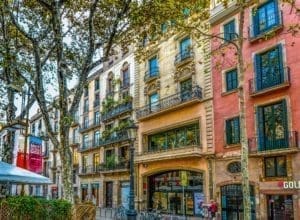Libyan Jewry – Eligible for Portuguese Passport
Until the end of the 20th century, Libyan Jewry constituted one of the most ancient Jewish communities in the world. At the beginning of the 16th century, the Spanish Inquisition had almost decimated the Libyan Jewish community. But thanks to the resourcefulness of Spanish Jewish expellees who arrived in Libya, the local community revived and ultimately flourished over the years, until most of the Libyan Jewry immigrated to Israel in the 1970s to escape Muammar Gaddafi’s tyrannical reign.
Libyan Jews can trace their roots to Spanish expellee families and are eligible for Portuguese citizenship. This will grant them a sought-after European passport and the privilege to work, reside, or settle in European Union member states. Several attorneys in our office specialize in emigration to Portugal and will be happy to assist you.
Libyan Jewish community
After the expulsion of Spanish Jews in 1492, a small number of expellees arrived in Libya. However, Libya in those years was not a particularly favored destination for the expellees, being home to a small Jewish settlement and an impoverished Muslim population. The expellees arrived primarily over land, due to the threat of pirates along the Libyan coast.
Among the Sephardic exiles were some who had been taken prisoner while sailing in search of refuge in one of the Mediterranean countries. Libyan Jews rescued these refugees, who then decided to settle in Libya, particularly in Tripoli. The sense of relief that they felt was short-lived; Libya was conquered in 1510 by the Spanish King Ferdinand (the same king who expelled the Jews in 1492).
Persecution of Libyan Jews by the Spanish Inquisition
 Under Spanish rule, the Jewish community in Tripoli was pushed to the edge of extinction. The Spaniards brought the Inquisition in Tripoli and harassed the Jews, forcing them to convert to Christianity and selling some into slavery. Some of the Jews converted to Christianity and lived as Anusim (forced converts who lived as secret Jews). But if they were caught practicing their religion, they were tortured by the horrendous methods of the Inquisition. The Spaniards emptied Tripoli of its Jews, who found refuge deep in the desert and lived there in caves.
Under Spanish rule, the Jewish community in Tripoli was pushed to the edge of extinction. The Spaniards brought the Inquisition in Tripoli and harassed the Jews, forcing them to convert to Christianity and selling some into slavery. Some of the Jews converted to Christianity and lived as Anusim (forced converts who lived as secret Jews). But if they were caught practicing their religion, they were tortured by the horrendous methods of the Inquisition. The Spaniards emptied Tripoli of its Jews, who found refuge deep in the desert and lived there in caves.
On the conditions in the city and the Jews’ escape from it, we can learn from the words of Tzemach Tzadik: “Tripoli which is in Africa was a great city unto God, was trapped in the year 1510, the Jews who were there were carried into captivity by the enemy, and Tripoli lost all its glory, and the city would remain desolate.” According to a description by Rabbi Mordechai Cohen, only 40 Jews remained in Tripoli out of 800 families, showing how close they were to total extinction. Although the Jewish settlement in Tripoli would return to “normal” in 1551 under Ottoman rule, they would remain without a leader or religious guidance until then.
Rabbi Shimon Lavi – Restoration of Libyan Jewry
Rabbi Shimon Lavi was a renowned doctor and rabbi of the Libyan Jewish community, from the city of Fez. In 1559 he set out to immigrate to Israel from Spain, but stopped on his way in Tripoli. There he found a low level of literacy, a lack of Torah education, and a lack of occupation for Jews in Tripoli and throughout Libya, due to the crises and persecution they had experienced during the Spanish occupation. The Sephardic rabbi decided to settle in Libya and restore the local Jewish spiritual life. First he set about reactivating religious institutions – establishing religious courts and synagogues.
His second task was to educate students in Jewish law, jurisprudence, ritual slaughter, kabbalah and poetry, which would create a foundation for teaching future generations. Rabbi Shimon Lavi’s relation to Libyan Jewry has been compared to Rabbi Yochanan Ben-Zakkai’s relation to the generation of Jews after the destruction of the Temple. During his time in Libya, Shimon Lavi wrote the famous liturgical poem, known and sung throughout the Jewish diaspora, “Bar Yochai”. He also wrote a commentary on the Zohar on the book of Genesis, called “Ketem Paz”. This was considered one of the deepest commentaries on the Zohar written in North Africa.
At the beginning of the 17th century, a wave of Jews emigrated from the Italian city of Livorno, and some of these Sephardic Jews settled in Tripoli. The arrivals brought with them their trading connections with Italy, providing new economic momentum for the Jews of the city. The Jews gained a monopoly over the export of goods such as ostrich feathers, turmeric, and fabrics, as well as tax farming. They also worked as clerks, farmers, petty traders, and peddlers, as well as metalworker and gold- and silversmiths.
Articles about Spanish Jewish expellee communities
Here is a list of some additional articles on the Spanish Expulsion and communities of expellees from Spain and Portugal in the various countries where they ended up after the expulsion.
Thank you to Mr. Jonathan Gavrielov for his help in researching and writing the above article on Spanish expellees in Libya and additional articles on Spanish and expellee communities.
- The history of Spanish Jews in Turkey
- Spanish Jewish expellees’ integration in Bulgaria
- Surnames with historical Spanish/Portuguese connection, eligible for Portuguese citizenship
- The phenomenon of Anusim (secret Jews) in Spain before the expulsion
- Dishes with Sephardic Jewish roots
Eligibility check for Portuguese citizenship – Contact expert lawyers
Our law offices specialize in obtaining Portuguese citizenship for descendants of Libyan Jews and other Spanish Jewish expellees. We will be happy to help you with the relevant information. Schedule a meeting with an attorney in Jerusalem or Tel Aviv to obtain legal information and assistance regarding emigration to Portugal.
מאמרים מומלצים

